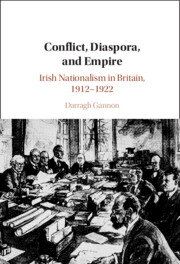Book contents
- Conflict, Diaspora, and Empire
- Conflict, Diaspora, and Empire
- Copyright page
- Contents
- Acknowledgements
- Introduction
- 1 Nationalists, Separatists, and the British Political Maze
- 2 Volunteers, War, and Rebellion
- 3 Nationalists, Republicans, and the Politics of War
- 4 Democracy, Citizenship, and the Irish National Ideal
- 5 Arms, Conflict, and Post-War Violence
- Conclusion
- Index
5 - Arms, Conflict, and Post-War Violence
Published online by Cambridge University Press: 15 June 2023
- Conflict, Diaspora, and Empire
- Conflict, Diaspora, and Empire
- Copyright page
- Contents
- Acknowledgements
- Introduction
- 1 Nationalists, Separatists, and the British Political Maze
- 2 Volunteers, War, and Rebellion
- 3 Nationalists, Republicans, and the Politics of War
- 4 Democracy, Citizenship, and the Irish National Ideal
- 5 Arms, Conflict, and Post-War Violence
- Conclusion
- Index
Summary
Chapter five evaluates the impacts of Irish republican military campaigns in Britain, from the conclusion of the 1916 Rising to the conclusion of the War of Independence in July 1921. It profiles the political languages and cultures of Irish republican militants in British centres; investigates the I.R.B.’s involvement in the post-war British arms trade with criminal gangs and Communists; and assesses the political, cultural, and social impacts of I.R.A. campaigns in Britain, from provincial Scotland to metropolitan London. ‘British’ I.R.B. sections, under the direction of Michael Collins, were integrated into a specialist, interconnected arms system designed to sustain the republican arsenal in Ireland. Their ‘circulation of weapons’, this chapter establishes, underpinned Collins’ war against the Dublin Metropolitan Police in 1919 and 1920. Between 1920 and 1921, meanwhile, British-based I.R.A. Volunteers carried out attacks in major English urban centres. This research establishes the influence of I.R.A. G.H.Q. over the campaign and the strategic ‘logic’ underpinning I.R.A. attacks in British centres. British political leaders at Downing Street, this chapter submits, judged I.R.A. attacks in Britain as a significant part of the wider republican military campaign in the months leading to the Truce.
Keywords
- Type
- Chapter
- Information
- Conflict, Diaspora, and EmpireIrish Nationalism in Britain, 1912–1922, pp. 212 - 272Publisher: Cambridge University PressPrint publication year: 2023



